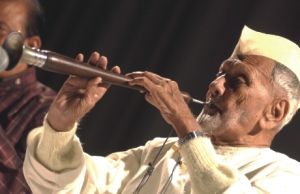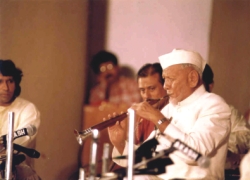| Obituary
Shehnai Maestro Dies at 91
Legendary musician Ustad Bismillah Khan, world's best-known shehnai player has died aged 91. He suffered a heart attack in hospital in his home city of Varanasi last week. Khan is credited with popularising shehnai, a wind instrument that can be loosely compared to an oboe, and elevating its status in India.
A one-day national mourning was declared in honour of the legend who had the rare distinction of playing the 'shehnai' as the Indian flag was unfurled at the historic Red Fort in New Delhi to mark the country's independence from Britain in 1947. Bismillah Khan was admitted to hospital last week after he complained of weakness. A practising Muslim, he made the Hindu holy town of Varanasi (also known as Benares) his home and could often be seen playing by the banks of the holy river Ganges, offering prayers to the Hindu goddess of learning, Saraswati.
Khan often played shehnai in the local temples too. He was seen as a symbol of India's religious pluralism and harmony for people of different faiths, and was awarded the country's highest civilian honour, the Bharat Ratna (Jewel of India), in 2001.
 A high point in his career was when he played shehnai at Delhi's Red Fort on the eve of India's Independence in 1947. Born on 21 March 1916, into a family of court musicians, Khan started training at a young age of six and was soon regarded as a master in his own right. A high point in his career was when he played shehnai at Delhi's Red Fort on the eve of India's Independence in 1947. Born on 21 March 1916, into a family of court musicians, Khan started training at a young age of six and was soon regarded as a master in his own right.
He was known for living a simple and austere life at his home in a narrow alleyway of Varanasi and cycle-rickshaw was his favourite mode of transport. Ustad Bismillah Khan was perhaps single-handedly responsible for making the shehnai a famous classical instrument. He brought the shehnai to the centre stage of Indian music with his concert in the Calcutta All India Music Conference in 1937. It was Khan Sahib who poured his heart out into Raga Kafi from the Red Fort on the eve of India's first Republic Day ceremony.
Ustad Khan was credited with having almost monopoly over the instrument as him and Shehnai are almost synonymous. His recital had almost become a cultural part of the Independence Day Celebrations telecast on Doordarshan every year on August 15th. After the Prime Minister's speech from Lal Qila (Red Fort) in Old Delhi, Doordarshan would broadcast live performance by the Shehnai maestro. And this tradition had been going on since the days of Nehru.
Bismillah Khan brought the shehnai to life every time he played whether it was the pure classical or the more folk based notes of the Kajri and Khayal. And for more than 80 years, he played each day in thousands of concerts, and recitals across the country and worldwide, mixing skill with passion.
 Once in a flow, there was no stopping him. At a session in Mumbai he told NDTV to keep the cameras rolling and that he was an old man so we should not miss the opportunity to capture his message. In the same interview, he jokingly said that he increasingly felt that he should stay in Benares in his simple almost austere home. Once in a flow, there was no stopping him. At a session in Mumbai he told NDTV to keep the cameras rolling and that he was an old man so we should not miss the opportunity to capture his message. In the same interview, he jokingly said that he increasingly felt that he should stay in Benares in his simple almost austere home.
This time he adamantly refused the offer of treatment in Delhi and so when the end came, he was where he always wanted to be. Despite his fame, Khan's lifestyle retained its old world Benares charm. His chief mode of transport was the cycle rickshaw. A man of tenderness, he believed in remaining private, and that musicians are supposed to be heard and not seen.
Ustad Khan will remain one of the finest musicians in post-independent Indian Classical music and one of the best examples of Hindu Muslim unity in India.
This article has been compiled from various sources.
Copyright
(R) thedailystar.net 2006 |
